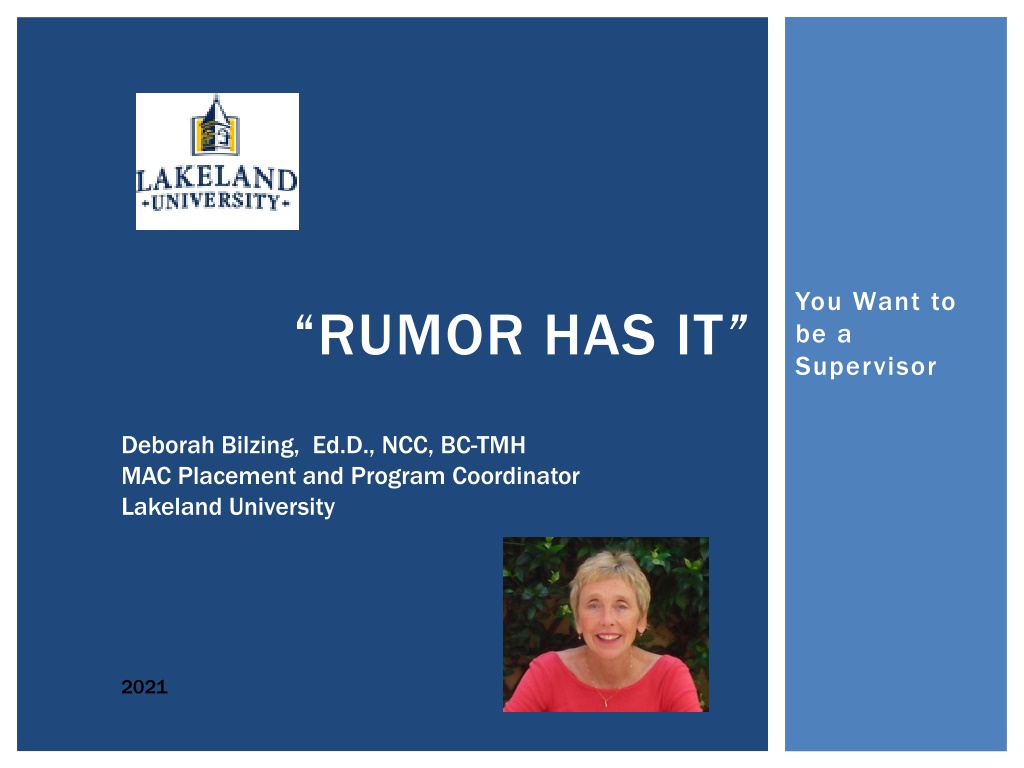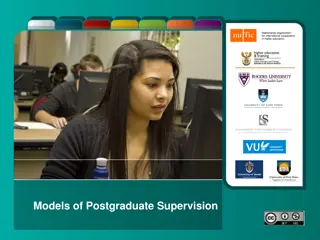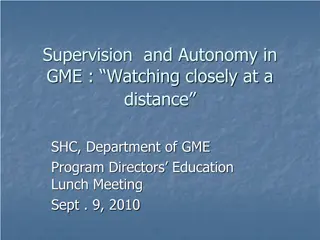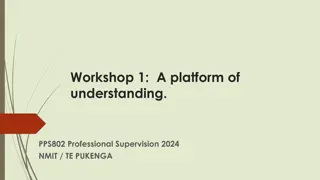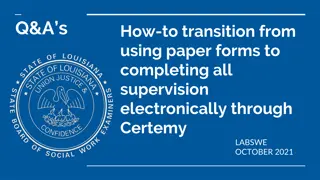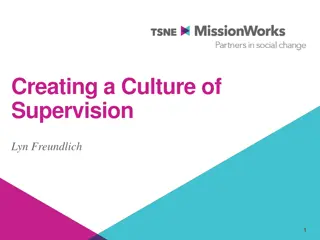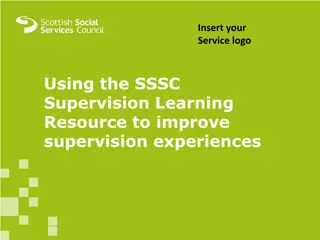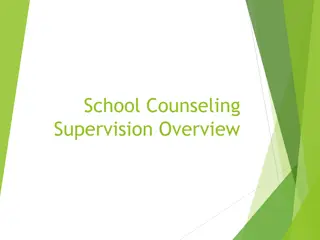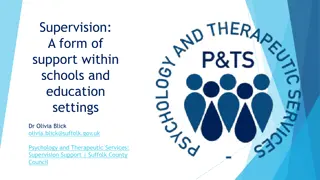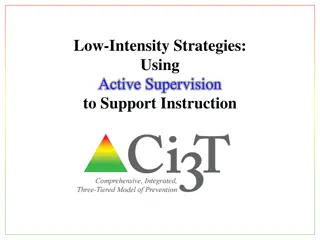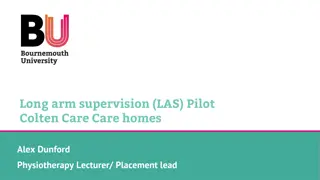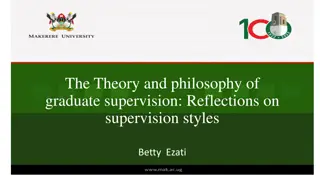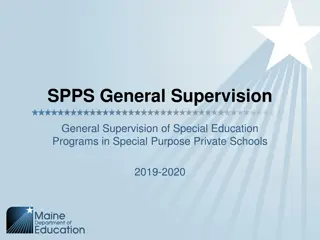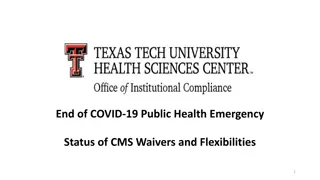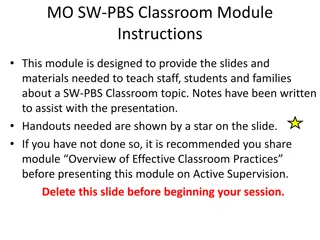The Art of Supervision: Enhancing Professional Development
Explore the diverse facets of supervision, including its essence, definitions, models, and crucial role in professional growth. Uncover insights shared by notable figures such as Rosalynn Carter and delve into various models of supervision like Psychotherapy-Based Models. Discover the transformative impact of supervision in guiding professionals from novice to expert levels.
Download Presentation

Please find below an Image/Link to download the presentation.
The content on the website is provided AS IS for your information and personal use only. It may not be sold, licensed, or shared on other websites without obtaining consent from the author. Download presentation by click this link. If you encounter any issues during the download, it is possible that the publisher has removed the file from their server.
E N D
Presentation Transcript
You Want to be a Supervisor RUMOR HAS IT Deborah Bilzing, Ed.D., NCC, BC-TMH MAC Placement and Program Coordinator Lakeland University 2021
THE GOOD, THE BAD, AND THE UGLY http://www.youtube.com/watch?v=Hf8mjMU5aJk
A LEADER TAKES PEOPLE WHERE THEY WANT TO GO. A GREAT LEADER TAKES PEOPLE WHERE THEY DON T NECESSARILY WANT TO GO BUT OUGHT TO BE. ROSALYNN CARTER
SUPERVISION..WHAT IS IT? SUPERVISION ..WHAT IS IT? An intervention provided by a more senior member of a profession to a more junior member or members of same profession. Relationship is evaluative, extends over time & has simultaneous purposes of enhancing the professional functions of the more junior person(s), monitoring the quality of professional services offered to the clients, & serving as a gatekeeper of those who are to enter the particular profession. Bernard & Goodyear, 1998/2004
ANOTHER DEFINITION BY POWELL, D. & BRODSKY A. (2004) STATES THAT: Clinical supervision is a disciplined, tutorial process wherein principles are transformed into practical skills, with four overlapping foci: administrative evaluative clinical supportive
SOME MODELS OF SUPERVISION Psychotherapy Psychotherapy- -Based Models types of therapy themselves. Examples are: Psychodynamic approach to supervision- Frawey-O Dea & Sarnat (2001) Feminist model of supervision- Haynes, Corey & Moulton (2003) Cognitive-Behavioral supervision- Liese & Beck (1997) Person-Centered supervision-Based on the work of Carl Rogers Interpersonal Process Recall -Kagan & Kagan (1963) Developmental Models of Supervision Developmental Models of Supervision- -In general these models define progressive stages of supervisee development from novice to expert with each stage consisting of discrete characteristics and skills. Examples are: Integrated Developmental Model (IDM) Integrated Developmental Model (IDM)- - Stoltenberg and Delworth (1987) Ronnestad and Skovholt s Model- (2003) Eight Stages Developmental, Solution-Focused Supervision-Juhnke (1996) Based Models- - These models are a natural extension of the various Integrative Models of Supervision Integrative Models of Supervision- - These models rely on more than one theory and technique and use many different approaches and techniques of supervision. Examples are: Bernard s Discrimination Model-Janie Bernard (1979) System Approach-Holloway (1995)
ONE OF THE MOST RESEARCHED MODELS OF SUPERVISION IS IDM IDM has now become the best known & most widely used counseling development model because it is both: descriptive of trainee processes (Three Levels) prescriptive w/respect to supervisor interventions Three Levels) Theoretical Foundations of IDM Model Understanding change over time in one s ability to function as a professional is fundamental in practice of clinical supervision. Professional and personal growth tend to follow a less than linear path change over time tends to occur in spurts & periods of delay (sometimes regression) Metaphor of development helps in this understanding
LEVEL 1 Supervisor Interventions Observations are crucial at this level as graduate students may not always perceive accurately what they are doing Additional interpretation and support from supervisors is necessary for skills to really take hold When possible, group supervison is a good training option
LEVEL 2 Supervisor Interventions Graduate students seem to be more comfortable with their range of skills and as such may explore various approaches to counseling Supervision is less at this level Challenging a graduate student at this level provides an opportunity for the graduate student to provide reasons for using certain approaches Pointing out strengths and challenges is very important at this stage Supervisors should provide a balance between support and mentoring helping to foster the graduate student s independence and self-assurance.
LEVEL 3 Supervisor Interventions Graduate students will benefit from more facilitative actions giving support, caring and even confrontation is appropriate at this level
CONCLUSIONS ON MODELS OF SUPERVISION Supervision is a complex activity. Professionals who supervise graduate students not only have to embrace the science of counseling and other professional skills, but also the domains of supervisee development. Numerous models of supervision have been developed and applied. No matter the approach, it is important for supervisors to be grounded in a theoretical framework. While this presentation was designed to focus on elements of good supervision, participants are encouraged to pursue further readings to enhance your supervisory orientation.
SUPERVISOR SUPERVISOR- -SUPERVISEE RELATIONSHIP RELATIONSHIP SUPERVISEE This relationship between supervisor and supervisee is: somewhat evaluative extends over time monitors service quality and acts as a gate-keeping process for those who are entering the profession. (Bernard and Goodyear, 2004) 12
THINKING ABOUT OURSELVES AS SUPERVISORS My best self as supervisor How that looks What I will be doing & not doing How to make that happen
SUPERVISOR RESPONSIBILITY 1. Provide a graduate student with regular supervision grounded in best practices. Challenge their assumptions. 2. Assist the graduate student in clarifying counseling theories helping to align their practice with their chosen theory. 3. Provide specific activities and experiences for the graduate student to engage in during their placement. 4. Assess and evaluate the graduate student s knowledge, skills and disposition on a regular basis and complete the graduate student s evaluation at mid-term and at the end of the placement experience. (Gatekeeping responsibilities) 5. Adhere to any agency, licensing, and accrediting requirements that may be a part of your profession. 6. Support and monitor the legal, ethical, and cultural competency issues that are a part of the counseling field.
GRADUATE STUDENTS' RESPONSIBILITY 1. To reflect upon the content and process of their work, 2. To receive information and another perspective concerning one s work, 3. To receive content and process feedback, 4. To be pro-active rather than re-active, 5. To ensure the quality of work they are performing. 6. Become more aware of their own biases and how their actions impact clients. 7. To go beyond required trainings and seek out opportunities to build on existing skills and knowledge 8. To discuss conflicts when they arise and confront personal and professional blocks to growth and self awareness, behaviors and conditions that may cause impairment.
STOP and THINK: STOP and THINK: Do you believe you have the skills and time to be an on-site Practicum or Internship supervisor? Why would you decide to take on the role of being an on-site supervisor? 16
What would you do as supervisor? THE ENVELOPE PLEASE
PERFORMANCE GOING DOWNHILL Situation 1 Situation 1 The graduate student appears to be having serious problems understanding his/her role and engaging in your counseling program. The graduate student s performance seems been going downhill rapidly and he/she has not responded to your efforts to be forthcoming or your expressions of concern for his/her welfare. 18
BOUNDARY ISSUES Situation 2 Situation 2 You have developed some concerns with your graduate student not knowing where to draw professional boundaries which is causing quite a distraction with your staff. The graduate student wanders the halls and discloses too much about his/her personal life with the staff especially at very inappropriate times.
CONFUSED GRADUATE STUDENT Situation 3 Situation 3 Performance and interpersonal relations among the graduate student, you, your faculty and staff, students, and parents has been great. You have normally left the graduate student alone. However, a new situation has developed, and it appears that the graduate student seems unable to address or solve the situation on their own. 20
COMMON CONCERNS Tardy/absence/early departures Inability to analyze and reflect Failure to implement appropriate suggestions- does not accept and apply feedback Poor time management Inadequate knowledge Can t relate to students Lack of classroom or other management skills Inability to relate to staff Inappropriate dress, not professional Other?
ADDITIONAL RESOURCES AND WEBSITES September/October 2015 September/October 2015 Solution-Focused Supervision: A Go-To Approach By Claudia J. Dewane, DEd, LCSW Social Work Today Vol. 15 No. 5 P. 24Abstract Background of Solution-Focused Approach The solution-focused approach is a form of brief psychotherapy developed by social workers Insoo Berg and Steve De Shazer in the 1980s (Walsh, 2013). Originally it was used for helping people overcome addictions, but the approach was then applied successfully to other behavioral and emotional disorders. Now its principles are being adopted in the corporate world as a management approach. Ironically, instead of social service administrators borrowing concepts from the management world, the corporate world is now borrowing management concepts from the behavioral science world. https://www.socialworktoday.com/archive/090915p24.shtml
PLAN & COMMITMENT TO SUPERVISION It is important that we continue focusing on ourselves as supervisors in addition to the process of supervision. As this presentation come to an end, I would like you to consider these questions: What is your plan & commitment as you leave here today? How can the MAC program support the continued professional development of professionals who volunteer to supervise counseling graduate students?
THANK YOU FOR PARTICIPATING! I encourage you to continue to have more discussions with your colleagues, students, and counseling professionals in your area!
OUR CONTACT INFO Deborah Bilzing, Ed.D., NCC, BC-TMH MAC Placement and Program Coordinator Lakeland University W3718 South Drive Plymouth, WI 53073 920-565-1021 x2119 BilzingDJ@Lakeland.edu
